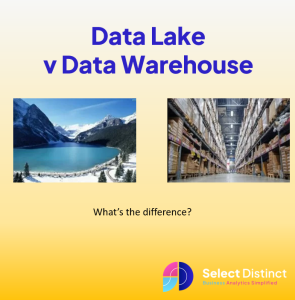Data Lakes v Data Warehouses
Data lakes and data warehouses store and manage data.
They differ in their architecture, usage, and capabilities.
In this blog, we will explore the key differences between a Data Lake and a Data Warehouse.
To help you choose the one that best fits your needs.
What is a Data Lake?
Organizations requiring a flexible and scalable storage system find data lakes well-suited. They can handle large amounts of raw and unstructured data from diverse sources. With data lakes, users can store data without worrying about its structure or schema, and process it into a structured format later on. Additionally, data lakes enable users to store data of any type, size, or format, making them a versatile solution for complex analyses.

What is a Data Warehouse?
Data warehouses are a great choice for organizations that require standardized reporting. With analytics on structured data from multiple sources. Data warehouses can store data in a predefined schema. This can be easily queried and analysed for business intelligence (BI) applications.
“Data warehouses optimize for read-heavy workloads.. And can support complex queries and reporting

Key Differences:
Here are the key differences between a data lake and a data warehouse:
Data Type:
- Data lakes store raw, unstructured data in its native format.
- Data warehouses store structured data in a predefined schema.
Storage Architecture:
- Data lakes use object-based storage such as HDFS, Amazon S3, or Azure Blob Storage.
- Data warehouses use a relational database management system (RDBMS).
Data Processing:
- Data lakes allow users to store and process data in its native format
- Data warehouses require transforming data into a structured format before storing and analysing it.
Data Usage:
- Data lakes support data exploration and analytics
- Data warehouses support standardized reporting and business intelligence.
Scalability:
- Data lakes are highly scalable and can handle massive amounts of data.
- Data warehouses have a limited capacity and may require additional hardware or software to scale.
Cost:
- Data lakes are typically more cost-effective than data warehouses, as they do not require expensive hardware or software licenses.
Conclusion:
In summary, data lakes and data warehouses are two distinct data storage solutions with unique strengths and use cases.
Data lakes are best for storing large amounts of raw and unstructured data.
Data warehouses are ideal for standardized reporting and BI applications.
It’s crucial for organizations to evaluate their data storage needs and choose the solution that aligns with their requirements for scalability, cost-effectiveness, and data processing capabilities
Contact us if you want to find out more or discuss references from our clients.
Find out about our Business Intelligence Consultancy Service.
Or find other useful SQL, Power BI or other business analytics timesavers in our Blog
“We select our Business Analytics Timesavers from our day-to-day analytics consultancy work. They are the everyday things we see that really help analysts, SQL developers, BI Developers and many more people. Our blog has something for everyone, from tips for improving your SQL skills to posts about BI tools and techniques. We hope that you will find these helpful!
Blog Posted by David Laws



